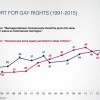
Research Over Coffee: How Foreign-Born Healthcare Workers Are Changing Houston
Doctors and nurses from foreign countries play a key role in improving the region’s communities – and its healthcare system.

Research Over Coffee: How Foreign-Born Healthcare Workers Are Changing Houston
Doctors and nurses from foreign countries play a key role in improving the region’s communities – and its healthcare system.

Houston’s Changing Views on Gay Marriage, in Three Charts
Though Texas elected officials oppose gay marriage, residents of its biggest city support it

What the 1960s Can Teach Us About How Segregation Affects Aspirations
As schools become more homogenous, historic surveys of black students offer insights

Research Over Coffee: How to Best Prepare for a Coming Hurricane
Predictors indicate who’s likely to skip town when the big one hits

To see the legacy of slavery, look at present-day school systems
Slavery has long since been abolished in the U.S. but the affect of its legacy may still linger in our education system.

The fastest growing city in America? You will never believe.
Many cities in Texas are growing faster than cities across America, but you will never guess what city is growing the fastest.

Houston Poised to Become Country’s #3 City
Based on current growth trends, Houston’s population could exceed that of Chicago by 2030.

When “Diverse” Neighborhoods Are More Segregated Than They Appear
Even when residents of different races live near each, their lives may not overlap in meaningful ways.

How Foreign-Born Residents Benefit City Economies
Nearly a quarter of Houston’s population was born abroad, giving the city greater access to foreign trade.

Should the Census add more choices on gender?
Starting in 2000, the Census offered more flexible choices when it comes to race. Should it offer broader choices on gender too?

Turf Wars: What racial boundaries tell us about 311 calls in the city
By analyzing nearly 8 million 311 reports in New York City, researchers paint a portrait of what drives local tensions.

Why there’s a disconnect between Texas voters and their lawmakers
Increasingly, Texans and their elected officials aren't seeing eye-to-eye. That's not just a coincidence.

What Millennials Think of Homeownership (and why it matters)
Optimistic about their own economic futures, they're still leery of the housing market almost a decade after the real estate bubble burst.

Urban inequality is not just about the concentration of poverty. It is also about the concentration of wealth. The renewed focus on wealth has received recent media attention – and rightfully so. But researchers need to take careful steps as they tell the story of wealth concentration in cities that are racially and ethnically diverse.

Global Lens, Local Focus: How Brownsville turned tragedy into opportunity
Site of tragedy now showing signs of life.
Rice University
Kraft Hall
6100 Main Street, Suite 305
Houston, TX 77005-1892